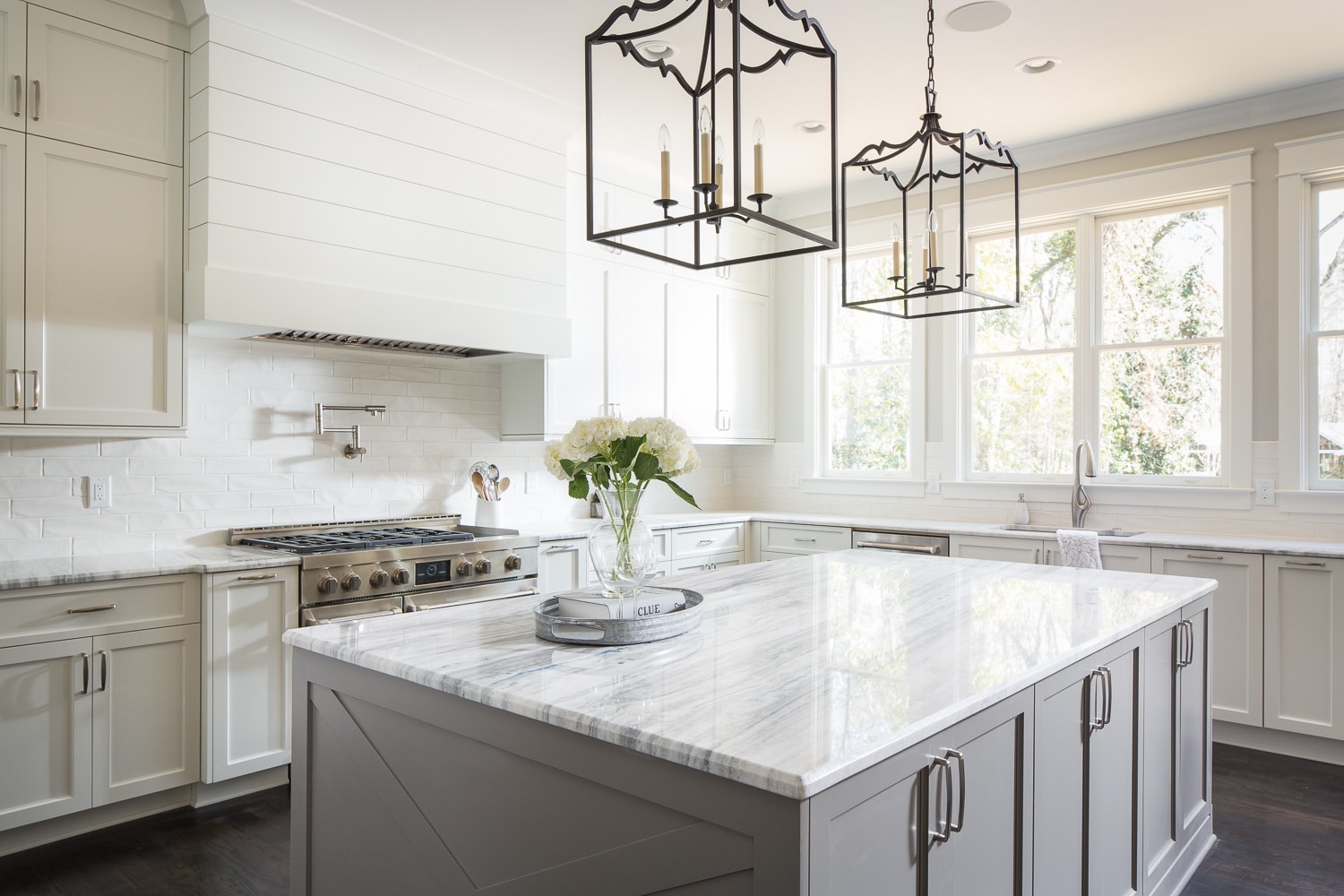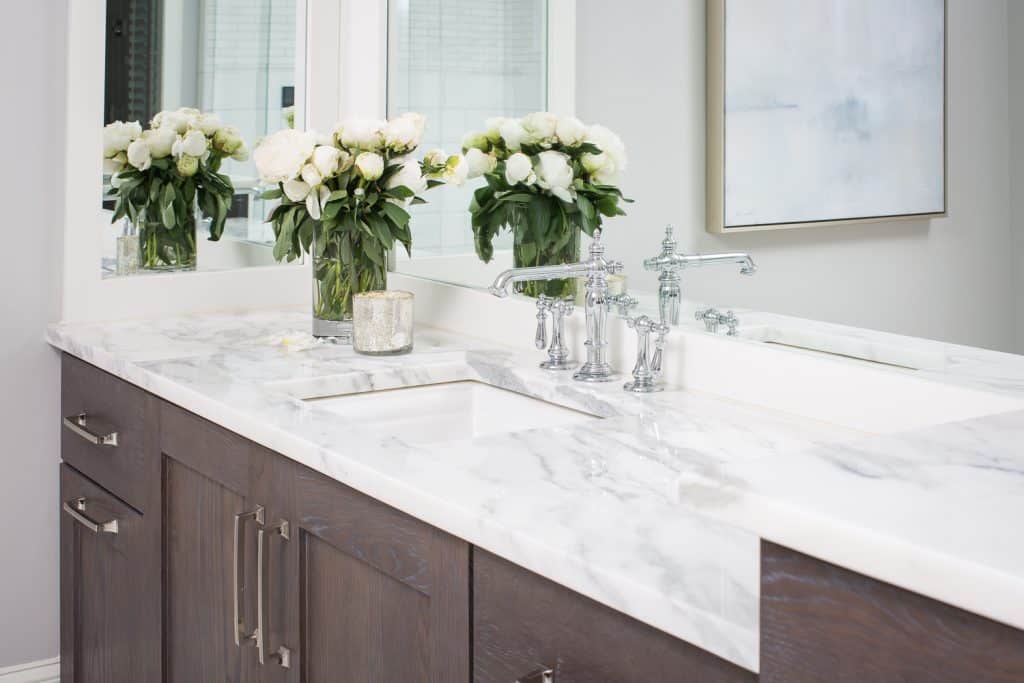Quartz
ENGINEERED STONE: COUNTERTOP CARE & MAINTENANCE


Quartz – Engineered stone consists of premium, durable materials, resulting in a low maintenance surface resistant to scratches and stains. With proper care and maintenance, Quartz will remain beautiful and durable for many years.
Basic Cleaning:
Normal cleaning requires only a damp cloth and mild household detergent. A list of acceptable cleaning products is located at the end of this document. For best results, clean spills as soon as possible. Mild non-abrasive cleansers are a good solution to keeping the surface looking new. Avoid using harsh chemicals or products that contain bleach. For tough spots from items such as gum, grease, paint, food, etc., gently scrape off the residue with a razor blade or putty knife prior to cleaning.
Spills and stains:
For stubborn spots or stains, soak a pad of paper towels in water and any of the recommended cleansers and apply the towel to the stain and let soak for a few minutes. Deeply clean with a non-abrasive scrub pad and cleanser, rinse thoroughly, and buff with a damp cloth.
Textured finishes:
Textured finishes require more frequent cleaning to maintain their appearance. Metal marks, fingerprints, and other signs of daily living will be more apparent. Most visible marks such as these can be removed by using a non-abrasive pad and any of the recommended cleaning products.
Durable but not indestructible:
Quartz can be damaged when in contact with strong chemicals and solvents. Avoid products containing trichloroethane or methylene chloride including paint removers, car battery liquid, furniture strippers, oven cleaners, and products containing bleach. These products can cause permanent discoloration and damage to the surface. In the event, these agents come into contact with the surface, wipe immediately, rinse with water, and then clean with vinegar-based cleaner. Do not use 3M ScotchBrite® green scrub pads or similar products, as they can dull the surface. When trying a new cleaning product, it is recommended that you always try the cleaner first on a hidden place of the surface and follow the cleaner manufacturer’s instructions.
Quartz can be damaged by excessive heat which causes the polyester binder to contract, leaving the surface exposed to heat feeling rough to touch and/or discolored. Avoid possible problems by using a trivet between the countertop and any hot pan or heat source.
Quartz is scratch resistant but can be scratched by materials harder than the engineer’s stone. For example, the bottom of some
ceramic dishes may be abrasive enough to scratch your Click Countertop. Quartz can also be damaged by impact causing the material to chip or crack. Do not stand on or apply excessive force to Quartz stone.
Non-bleach, non-abrasive liquid household cleaners:
- Simple Green Lime-scale remover
- Formula 409 Glass and Surface Cleaner
- Vinegar cleaner (diluted)
- Lysol
- Greased Lightning
Granite
NATURAL STONE: COUNTERTOP CARE & MAINTENANCE

Tools:
- Water
- Dish soap
- Microfiber cloths
- Baking Soda
- Hydrogen Peroxide
- Plastic Wrap
- Tape
Cleaning:
Use a mix of warm water and mild dish soap for everyday cleaning, following up with a microfiber towel to shine up the stone. Avoid abrasive or acidic cleaners, which can strip the sealer and etch the stone.
Stain Removal:
For stains on granite or marble countertops, clean with a paste of baking soda and water (for oil-based stains) or hydrogen peroxide (for water-based stains). Apply the paste to the stain, cover with plastic wrap, and tape down the edges. Let sit for a few days (or overnight at the very least), and then rinse off the paste. Repeat the process if the stain isn’t completely gone. Be sure to do a spot test first to make sure the method won’t affect the color or finish of the stone.
Sealing:
These surfaces are popular for their tough-as-rocks durability, but they do need to be resealed regularly to protect them from stains. Reseal granite once a year and marble every few months
Marble
NATURAL STONE: COUNTERTOP CARE & MAINTENANCE


Marbles are made up primarily of calcite crystal. Due to their mineralogical makeup, all marbles are vulnerable to either abrasion or chemical attack. Scratching could occur from common kitchen utensils. Lemon juice, tomatoes, vinegar, and any other acidic solutions will etch the surface, removing the polish of the stone. Although red wine is the most commonly feared liquid near a kitchen, foods that have both acidic and oily qualities are usually more harmful because the oil acts as a carrier into the stone. Salad dressings and marinades are common culprits. Marble countertops will reflect the character of the family and change to tell the story of the family using them: they will etch, bruise, chip, stain, scratch, and more over time. (We think this adds character!) Marble countertops may only look new for a few minutes after the install is complete. It does not take excessive force or neglect to damage marble countertops. They will wear, age, and distress with normal and everyday use.
Care & Maintenance of Marble Countertops and Floors:
Marble has a high absorption rate, and therefore, a sealer should be applied to help slow the rate of water and stain absorption into the stone. A sealer may slow down absorption to help prevent a stain in marble, but will not protect it against other wear/distress listed above.
- DO clean up spills immediately with a wet cloth.
- DO use trivets or mats under hot dishes and cookware.
- DO use placemats under china, ceramics, silver, and other objects that can scratch the stone’s surface.
- DO use coasters under glasses, especially if they contain alcohol or citrus juices.
- DO clean surfaces regularly with mild soap and water.
- DO use a tray for toiletry products in the bathroom to protect the surface from the damaging chemicals contained in many toiletry products.
- DON’T use cleaners that contain acids such as bathroom cleaners, grout cleaners, or tub cleaners.
- DON’T use vinegar, bleach, ammonia, or other general-purpose cleaners.
- DON’T use abrasive cleaners such as dry cleansers or soft cleansers.
- DON’T use alkaline cleaners not specifically formulated for stone.
- DON’T use scouring powders and abrasives because they will scratch the surface.
- DON’T place toiletry products directly on the countertop surface.
Avoid setting beverage glasses directly on marble, as they leave rings.
If you have someone come in to clean your home, make sure they only use the products that you provide, not the strong chemical-based commercial cleaners typically used.


